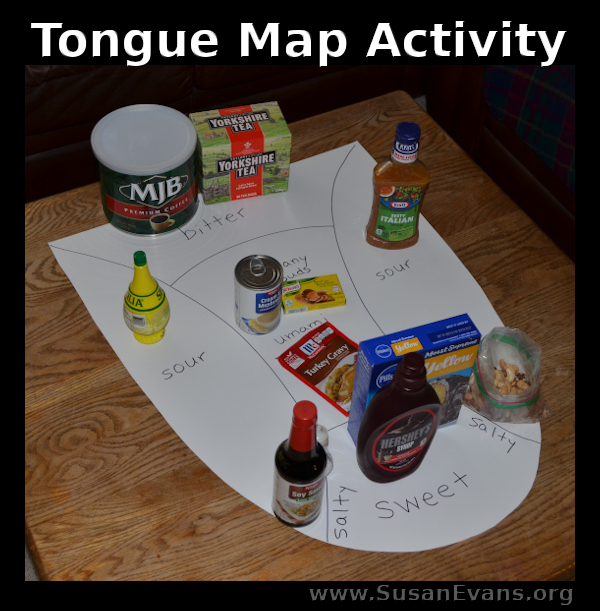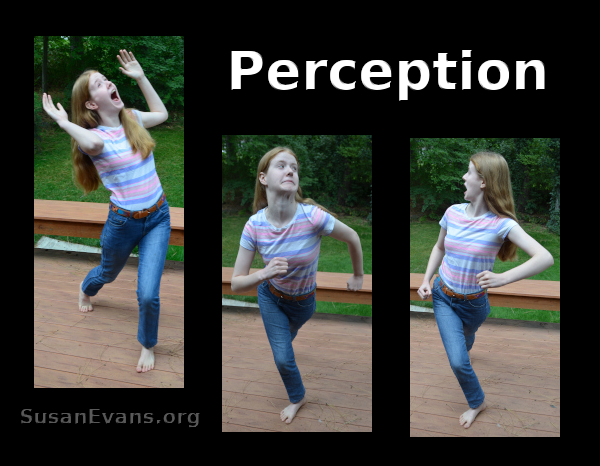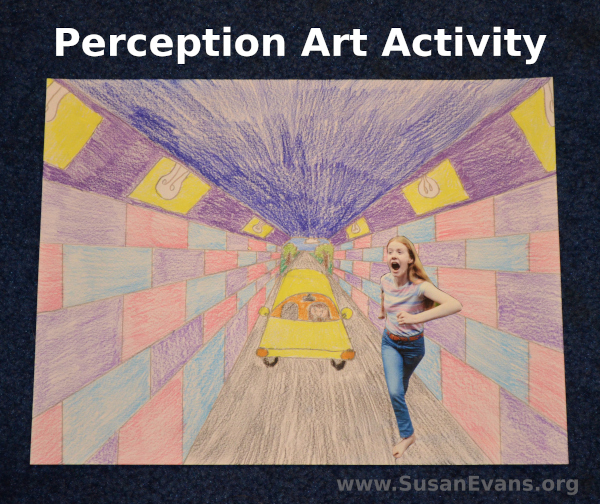We did a hilarious tongue map activity when we studied perception for the second chapter in our psychology curriculum. We grabbed a large poster board and labeled the different sections of the tongue, emphasizing where the tongue is most sensitive to different tastes. Even though we have taste receptors for all flavors all over the tongue, some areas are more sensitive to sweet taste, for example. The tip of the tongue is the perfect place to lick an ice-cream cone, because if you just placed a small spoon of ice cream in the center of your tongue, it would not taste as good.
Tongue Map Activity & Perception (video demonstration)
Besides the fun activity of placing foods on different locations of a tongue map poster, I showed you a fun activity you can do with a different sense–the sense of sight. Sometimes your eyes will deceive you into thinking you see something that you don’t. If you stare at MC Escher sketches, for example, you get thrown off. (You can see a whole set of fun activities we did when we celebrated an MC Escher Party, including creating our own tesselations.)
What I’m trying to say is that on the scene of a crime, various people who are standing around will perceive the same identical situation in different ways, depending on so many factors like angle of vision, presuppositions, fear, lack of eyeglasses, doing too many things at once and being distracted, etc. I’m sure you’ve noticed this when you watch mystery television shows. Perception can be distorted and can’t always be trusted.
Perception Art Activity
In my years as a school teacher, I saw the art teachers doing perspective drawings with their classes. One of these activities is super fun and looks distorted like Alice in Wonderland. You draw a small square in the middle of the paper and draw diagonal lines out from the center to form a hallway or elongated room or tunnel. Then you draw a cartoon scene and color it. Next, add a photo of the student inside the cartoon! This is the result:
I found more examples of this perspective activity here: Perspective Art for Older Kids.
All the other senses matter, too, such as the sense of smell (that I briefly described in the video), the sense of hearing (we did a hands-on sound activity here: Sound Collection), and the sense of touch. The five senses take in information, and our mind makes sense of the world around us as we take in this sensory information, based on past experiences and other things we have learned over the years.
My daughter read a book about Helen Keller, a girl who could not see, hear, or speak. She said that when she read the book, she couldn’t put it down… so she stayed up until midnight and was tired the next day. Here are some of her observations about the book:
The Miracle Worker
A book report by Rachel Evans
The Miracle Worker by William Gibson is a short and sweet read. The focus of the story is on Helen Keller, a blind and deaf girl who wants to experience the world in the same way everyone else does, but doesn’t know how. Enter Annie Sullivan, a 20-year-old girl who used to be blind, but after much effort, isn’t anymore. Everyone is doubtful of Annie’s abilities at the start, but soon she wins them over with an out-of-the-box plan to get Helen to like her.
Over the next two weeks, Annie lives in somewhat isolation with Helen, but of course with a servant/helper, Percy. Helen learns manners as Annie tries to teach her how to talk using her hands, but Helen doesn’t quite get it. Meanwhile, James, who I’m pretty sure is Annie’s long lost brother at this point, doesn’t look like he’s been given the right balance of parental grace and punishment for wrongs. Anyhow, I kinda like James.
At the end of the two weeks, Helen and Annie return back to the family house to eat dinner. Helen tests everyone to see if she can still get away with her old behavior, and Annie’s having none of it. She picks her up and takes her outside to refill the pitcher Helen knocked over. As Helen refills it, she suddenly realizes what Annie has been trying to teach her the whole time. Annie flips out, which of course grabs the attention of the rest of the family; Helen’s mother and father are sweetly kneeling in front of her, which, by the way, is in my opinion the most precious moment in the whole book. And they lived happily ever after.
In case you are wondering what curriculum we are using for psychology, we are studying {affiliate link} Introduction to Psychology by 7 Sisters Homeschool. We had such a fun time with this chapter on perception!







